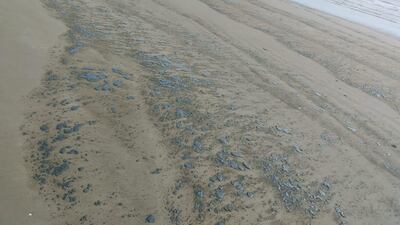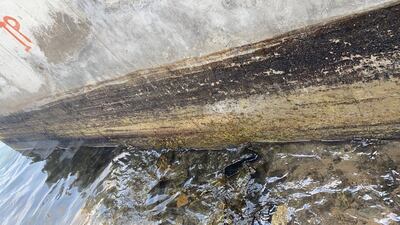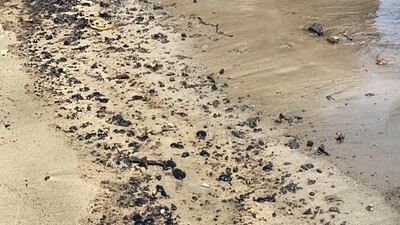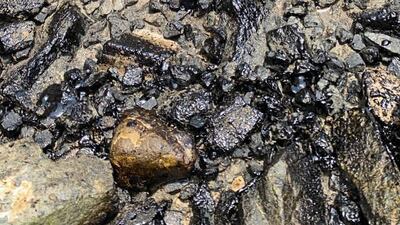Dozens of sea snakes were killed by a “ghost” oil slick at Kalba off the UAE’s east coast late last year, according to new research that has highlighted how vulnerable the creatures are to marine pollution.
In the space of just a week in November, 39 of the creatures were found dead, most with oil covering the majority of their bodies.
Researchers believe the true number killed may have been much higher, because some are likely not to have been found.
Oil spills happen intermittently on the UAE's east coast with the blame being laid at tankers illegally cleaning their holds.
Sharjah Environment & Protected Areas Authority
“We were surprised to find [dead] sea snakes in such high numbers,” said Fadi Yaghmour, a scientific researcher at the Sharjah Environment & Protected Areas Authority and the first author of the new study.
“It’s not something that has been reported or recorded before. What’s really a small spill had quite a devastating effect on these animals. One can only imagine what a larger spill could do to these species.”
Titled, “Oil spill causes mass mortality of sea snakes in the Gulf of Oman”, and published in Science of the Total Environment, the study is thought to be the first to report the deaths of sea snakes because of oil spills.
The EPAA was alerted to the “ghost slick” — so named because its cause remains unknown — by local fishermen who spotted oiled birds.
While sea snakes made up more than four fifths of the creatures known to have been killed by the slick, birds and sea turtles also died. Crabs were also seen covered with oil.
Sea snakes decompose faster than some other marine creatures, and may not be spotted if they are mixed up with oil when it is being cleared away, so Mr Yaghmour said the actual death toll was likely to be higher than that recorded.
Several factors make sea snakes particularly vulnerable to oil slicks. Even a small amount on their body surface can prevent the creatures from swimming normally, making it harder for them to catch prey, Mr Yaghmour said.
Also, while they have lungs and breathe like most other reptiles, sea snakes take in some of the oxygen they need through their skin, something that becomes impossible to do if the creature is covered with oil.
One species, the yellow-bellied sea snake (Hydrophis platurus), is particularly vulnerable because it hunts near the surface rather than deeper in the sea. It accounted for almost half of the dead creatures.
At least eight true sea snake species live in UAE waters and, while none is known to be endangered, these highly specialised creatures are the “least studied” reptiles in the country, said one of the study’s other authors, Johannes Els, from the Breeding Centre for Endangered Arabian Wildlife, part of the EPAA.
“There are no species-specific conservation measures in place for sea snakes,” he said. “Only two species are confirmed to date within any of the marine protected areas in the UAE.
“The priority for research in the UAE is for a better understanding of the distribution of the sea snake species, their habitat requirements, population size and identifying possible threats to their survival.”
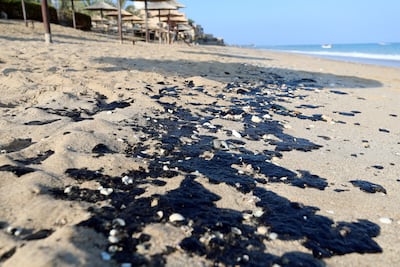
Of the snakes found dead, 82 per cent had oil covering at least three quarters of their body surface, and most had oil covering their snouts and eyes. Many also had oil in their mouth, oesophagus and stomach.
“It’s a very gruesome way for an animal to die,” said Mr Yaghmour. “They are portrayed as vicious and perhaps ferocious animals. Sea snakes are [actually] quite delicate.”
Sea snakes are not found in the Atlantic Ocean, where the majority of large oil spills have taken place, but major spills that happened at the Nowruz oilfield in the far north of the Arabian Gulf are, however, likely to have had a significant effect on sea snakes.
There have been numerous reports of oil spills off the east coast of the UAE in recent years, with beachgoers complaining in March 2020 about oil on Al Aqah beach in Fujairah.
In October 2019 two ships collided and caused a three-kilometre oil slick along the Fujairah and Kalba coastline, while a spate of oil spills in 2018 were blamed on the offshore dumping by tankers of crude-laden ballast water.
As well as 19 yellow-bellied sea snakes also killed by the Kalba were 12 Arabian Gulf sea snakes (Hydrophis lapemoides), five yellow sea snakes (Hydrophis spiralis), two ornate reef sea snakes (Hydrophis ornatus) and one that was unknown.




